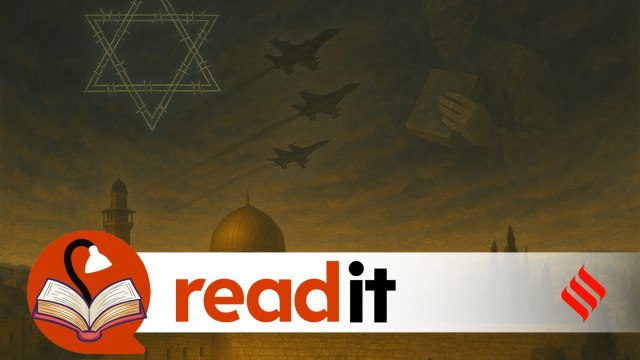Reading Israel: Books that help you understand a nation in conflict
Explore the Israeli psyche through books that chronicle tragedy, resilience, and conflict: from the Holocaust to Mossad's shadow games and America's unwavering support.
 (Generated using Open AI)
(Generated using Open AI)“If I forget thee, O Jerusalem…
May my right hand lose her cunning.”
Psalm 137:5, The Bible
Seemingly obsessed with the Holy Land, and its capital of Jerusalem, the Israeli mindset is something that has fascinated people for years now. When the nation was formed rather controversially in 1948, there were many who felt that it would not last long, surrounded as it was by an array of hostile neighbours, many of whose leaders had sworn to destroy it. And yet, Israel has not only survived but has emerged as perhaps the most powerful nation in the region, even while many who had predicted its demise have themselves become history.
A lot of credit for this goes to not just the support that the United States provides to it, but also to what is now becoming legendary as “the Israeli mind” – a mindset that revolves around a very aggressive form of defence, and in eliminating threats and opposition by any and all means. Many books have been written about Israel, some laudatory, some deeply critical, and while the Israeli mind itself is difficult to fathom, there are a few books that give you a deeper insight into how those in charge of the Jewish state think.
Burden of the Holocaust
To understand the depth of feeling most Israelis have for their nation, one needs to look at one of the greatest man-made tragedies of human history, the one considered by many to be a major reason for the creation of the state of Israel itself. This was the Holocaust, the mass extermination of Jews carried out by the Nazis from 1941-45, in which millions of Jews are believed to have been methodically killed, many in gas chambers in concentration camps.
While there had been pogroms and riots targeting Jews in the past, and they had been driven out of areas, the sheer scale and meticulous planning of the Holocaust is believed to have changed the Jewish mindset, teaching them to stand and fight and indeed, seek conflict with their enemies instead of shying away from it.
 (Photo: amazon.in)
(Photo: amazon.in)
There are dozens of books on the Holocaust, none capture the human aspect of the tragedy more poignantly than Martin Gilbert’s The Holocaust: The Jewish Tragedy. The book is almost a thousand pages long but is not heavy reading, although it will leave you with a heavy heart. Gilbert is known for focusing on personal narratives rather than academic ones, and as a result The Holocaust provides a disturbingly in-depth look at a massive failure of humanity as seen from the eyes of those who suffered it.
The accounts of children and women being beaten and dragged through the streets, the sight of a dead Jew lying tangled on a barbed wire fence at a concentration camp from which he was trying to escape, and the sheer bloody mindedness of those who carried out instructions to exterminate a race as if its members were pests rather than human beings, will stay with you long after you finish the book. It also gives one a better idea of why many Israelis often invoke the Holocaust whenever criticised for their actions – it is difficult to believe that something like this could have happened, and Gilbert’s book is a poignant reminder that it did.
Arrival of Israel
If Gilbert’s book gives one a perspective of the tragedy that changed the Jewish approach to life, Larry Collins and Dominique Lapierre’s O Jerusalem!, covers its first major consequence. The book revolves around the days that followed the creation of the state of Israel. In many ways, O Jerusalem is a bit like the authors’ other famous work, Freedom at Midnight (now a series on Sony LIV), only this time the new state that has been created is not India, but Israel.
 Photo: amazon.in
Photo: amazon.in
O Jerusalem! is history written for the mainstream reader, almost like a thriller, and based on thousands of interviews taken by the authors. The negotiations around the creation of Israel, the street fights that preceded and followed it, the creation of the legendary Israeli secret services, the slaughter of the innocent, all are covered in often dramatic detail. You also get fascinating portraits of historical figures like Golda Meir, David Ben-Gurion (the first Prime Minister of Israel), and King Abdullah of Jordan as well as those of lesser known people who played major roles in the events of the period, such as the Jordanian Army Major Abdullah Tal, whom King Abdullah of Jordan orders to “Habibi, go save Jerusalem” as the Old City seems set to fall into Israeli hands.
Most significantly, O Jerusalem! also highlights the new state’s hard, often merciless approach to conflict and of hardline, extreme Zionism becoming an essential part of its core identity – the massacre of Arabs by Israeli paramilitary in the village of Deir Yassin is terrifying to read for its sheer cruelty.
 (Photo: amazon.in)
(Photo: amazon.in)
Another book that captures this new mindset is Leon Uris’ Exodus. Written in 1958, barely a decade after the creation of the state of Israel, this 600-page novel is a work of fiction, but sold in such massive numbers that many credit it with creating a new identity for Israel and the Jewish community. Uris unabashedly admitted to the book being written from a pro-Israeli perspective “I set out to tell a story of Israel. I am definitely biased.”, and some even say that he was actually approached by a lobbying or public relations agency to do so.
While many of the events in the book are historical, including the journey of the ship SS Exodus (from which the book derives its name), which tried to carry Holocaust survivors to Palestine, but was stopped by the British, Uris’ narrative is believed to have shaped a widely criticised new template for the Middle East – one which portrays Jews as brave and civilised, waging a war against Arabs shown as brutal and savage.
The book is an out and out thriller and while historians might wince at its largely one-sided depiction of many events, it played a key role in the world’s perception of Israel at a time when media was limited to newspapers, books and a handful of TV channels and radio stations. David Ben-Gurion is himself believed to have said that “as a piece of propaganda, it’s the greatest thing ever written about Israel.” It even inspired a film of the same name, starring Paul Newman in 1960.
Rise and kill…also control the narrative
 (Photo: amazon.in)
(Photo: amazon.in)
A far more factual look at the way in which the state of Israel neutralises its enemies is Ronen Bergman’s Rise and Kill First, which revolves around Israel’s highly controversial strategy of targeted assassinations. The title of the book comes from one of Judaism’ most holy works, the Talmud, which states “if someone comes to kill you, rise up and kill him first.” Bergman claims to have conducted numerous interviews and gone through thousands of documents to come up with the book, which walks one through the inception of Israel’s policy of killing anyone it sees as a threat.
While this approach has become (in)famous in modern times, Bergman reveals that targeted assassinations were used by Jewish agencies to eliminate rivals, including Arab leaders, even before the formation of Israel. The methods of assassination are as diverse as simply shooting the person, to using poisoned toothpaste that takes weeks to kill, to complicated explosives. Rise and Kill First spans almost eight hundred pages, but is an absolute page turner and is morbidly fascinating, as it charts out the elaborate steps secret agencies take to eliminate those it sees as a threat.
At times, it all seems too fantastic to be true, but as the world discovered in Iran, Israel has a way of hitting its human targets. As in O Jerusalem!, one is struck by the almost total absence of doubt in the minds of those given the task of dealing out death to the enemy – there is little hesitation and a lot of determination.
 (Photo: amazon.in)
(Photo: amazon.in)
A more glamorous and less factual account of the work of the Israeli secret agencies, especially the Mossad, is seen in Daniel Silva’s spy thriller series of books revolving around Gabriel Allon, an art restorer who is also a secret agent and an assassin. The series spans more than twenty books and begins with The Kill Artist, with the latest, An Inside Job, expected in July, 2025. Well-written and racy, these are great primers for those who admire the Israeli secret services.
Targeted assassinations might be an important part of Israel’s policy (Bergman claims the nation has assassinated more people than any other Western nation), but there is a diplomatic side to the nation as well – one that shows that while the new Israel might be ready for battle, it has not forgotten the subtle art of manipulation that many associated with its faith (even Shakespeare painted Shylock as cunning). Israel’s spokespersons have come across as being aggressively outspoken over the years, and many ascribe this courage to the support it receives from the United States.
 (Photo: amazon.in)
(Photo: amazon.in)
But why does the United States support Israel so readily and often almost unreasonably? While there are all sorts of conspiracy theories about this phenomenon, the best explanation for it comes in John Mearsheimer and Stephen Walt’s meticulously researched The Israel Lobby and US Foreign Policy. The two professors say that there exist groups of people and organisations who skilfully steer the United States’ foreign policy to favour Israel, often branding its opponents as “anti-semitic.”
The book might come across as a slightly heavy read due to the profusion of documentation provided by the two authors, but it shows the other side of the Israeli mind, the one that believes in controlling the narrative and ensuring that its version of an event gets priority. Both Mearsheimer and Walt feel that the lobby might have Israel’s best interests at heart but its narrowness of vision might be actually doing more harm than good to both the US and Israel (witness the events in Iraq). The book is highly controversial but remains in print and not surprisingly, the authors have been accused of…anti-Semitism.
Capable of donning both the iron hand and the velvet glove, the Israeli mind is complex and not easy to fathom, no matter how much one reads about it. The more the reason to keep writing – and reading – about it. To paraphrase, “If I forget thee, O Jerusalem, May my mind lose its understanding of how an important part of the world works…”
Photos



- 01
- 02
- 03
- 04
- 05




























